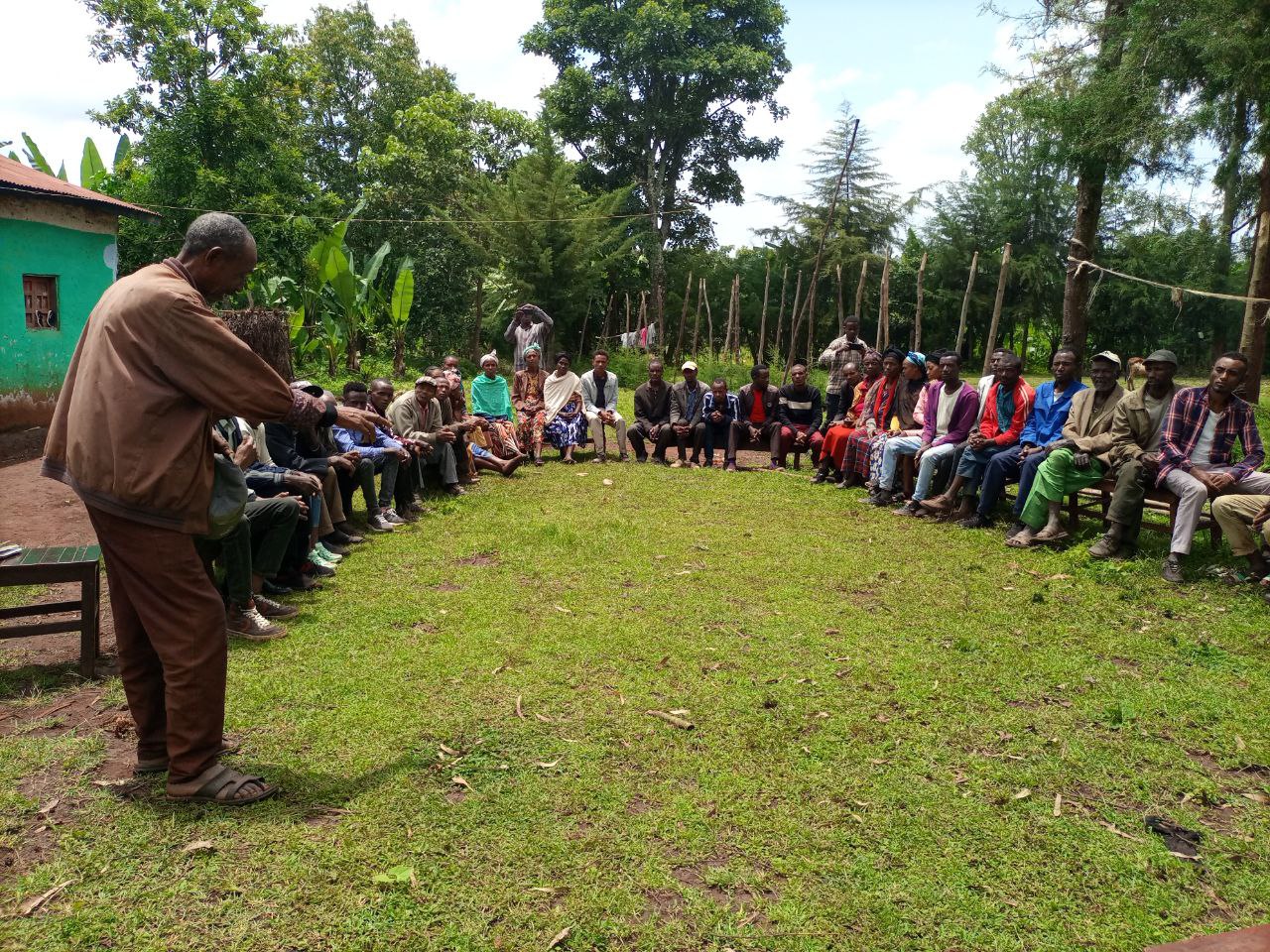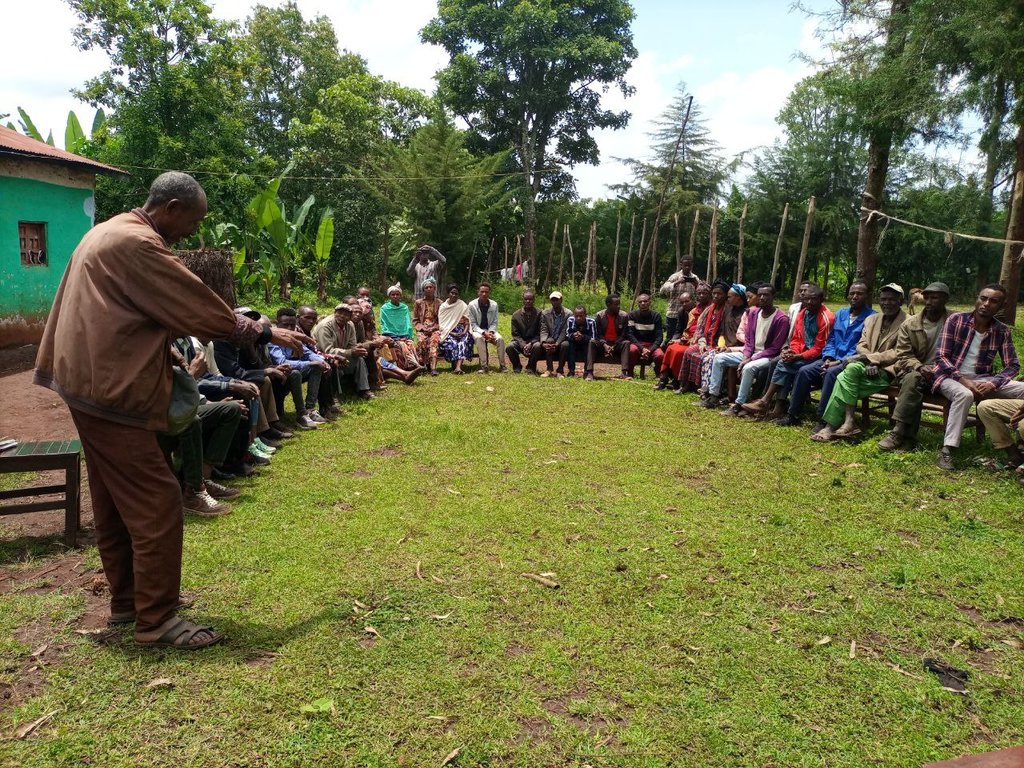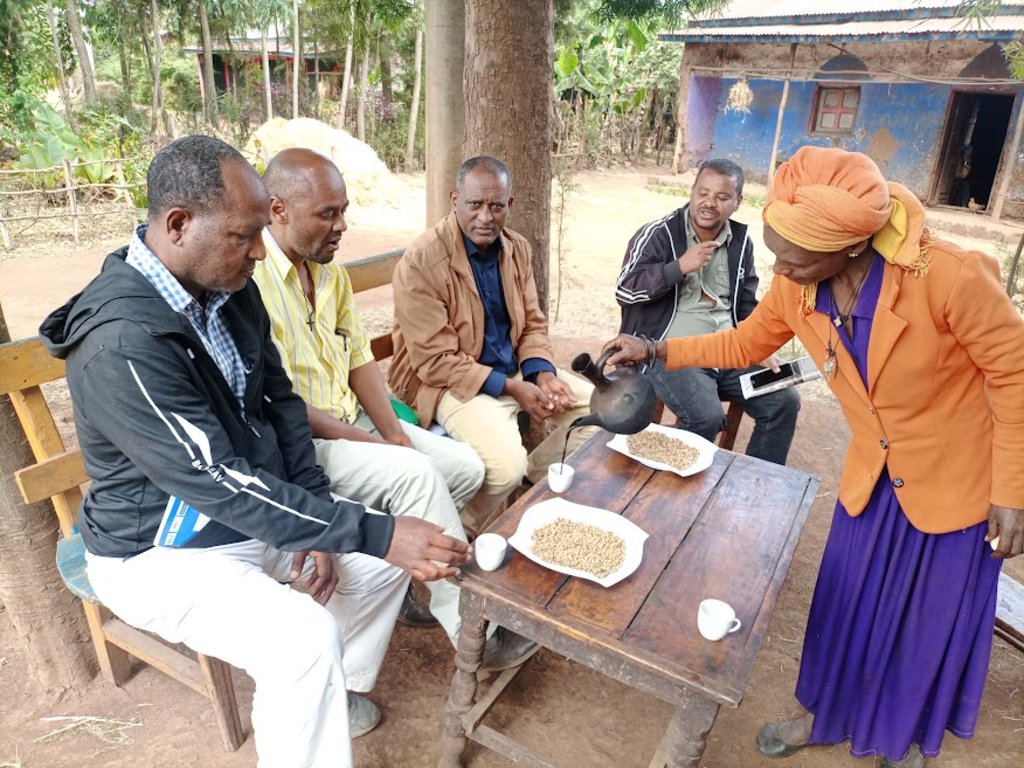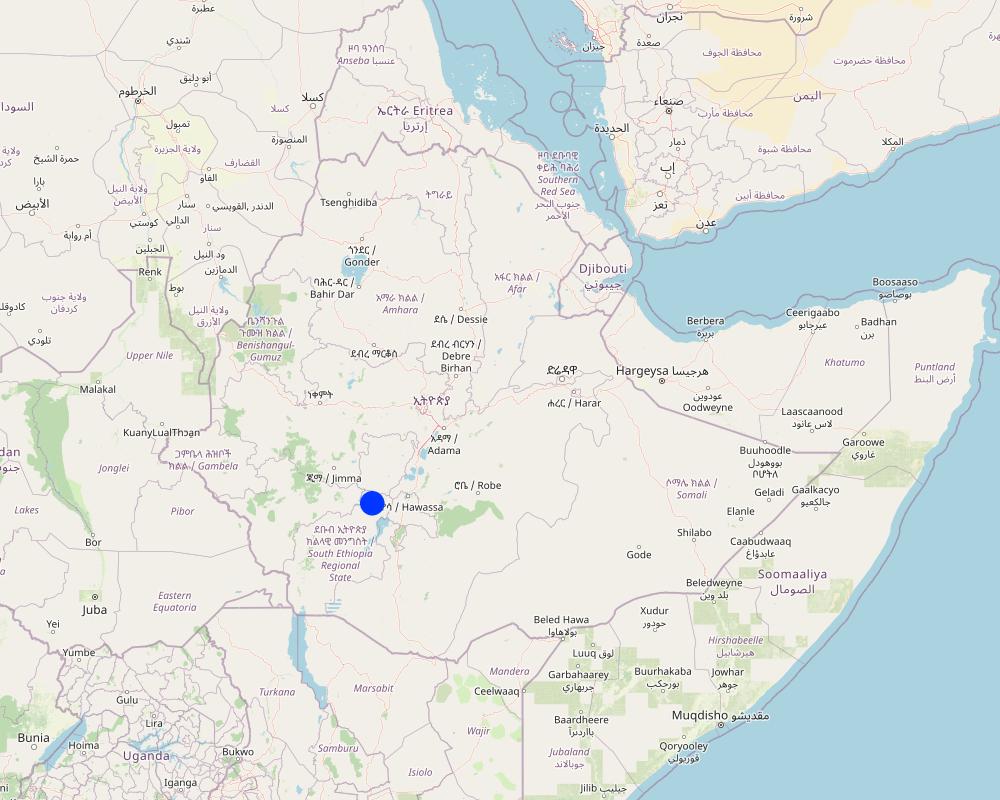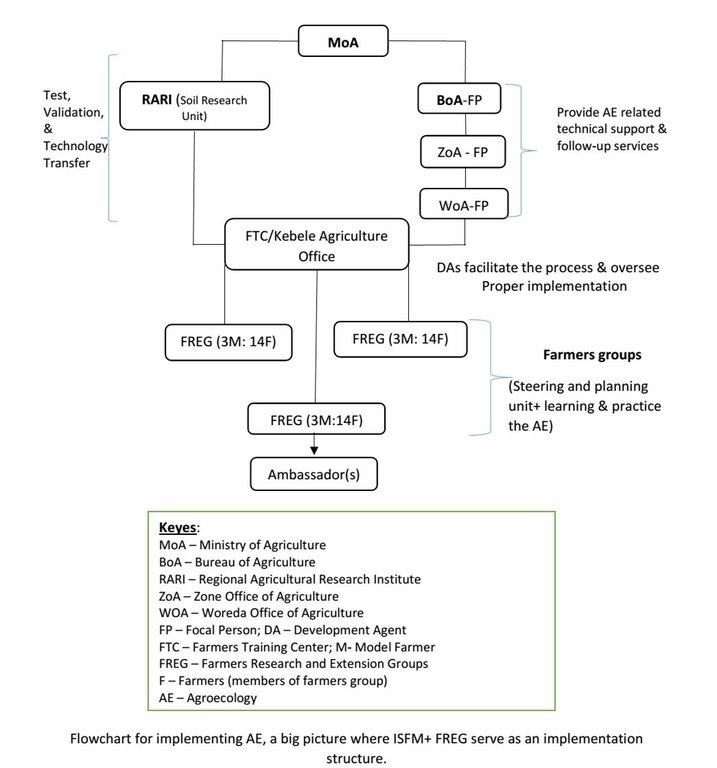Farmers Research and Extension Group (FREG) [Etiopía]
- Creación:
- Actualización:
- Compilador: GERBA LETA
- Editores: Julia Doldt, Kidist Yilma, Noel Templer, Tabitha Nekesa, Ahmadou Gaye, Siagbé Golli
- Revisores: William Critchley, Rima Mekdaschi Studer, Sally Bunning
FREG
approaches_6629 - Etiopía
Visualizar secciones
Expandir todo Colapsar todos1. Información general
1.2 Detalles de contacto de las personas de referencia e instituciones involucradas en la evaluación y la documentación del Enfoque
Persona(s) de referencia clave/s
Especialista MST:
Feleke Temaledegn
+251967693410
temaledgn12@gmail.com
SNNPR Bureau of Agriculture
Hawassa
Etiopía
Nombre del proyecto que facilitó la documentación/ evaluación del Enfoque (si fuera relevante)
Soil protection and rehabilitation for food security (ProSo(i)l)Nombre de la(s) institución(es) que facilitaron la documentación/ evaluación del Enfoque si fuera relevante)
CIAT International Center for Tropical Agriculture (CIAT International Center for Tropical Agriculture) - Kenia1.3 Condiciones referidas al uso de datos documentados mediante WOCAT
¿Cuándo se compilaron los datos (en el campo)?
16/01/2023
El compilador y la/s persona(s) de referencia claves aceptan las condiciones acerca del uso de los datos documentados mediante WOCAT :
Sí
1.4 Referencia/s al/los Cuestionario(s) de Tecnologías MST
2. Descripción del Enfoque MST
2.1 Breve descripción del Enfoque
A Farmers Research and Extension Group (FREG) engages about 50 or more farmers in a kebele (lower administrative unit), with three sub groups of 17-20 each who live in a homogenous landscape. It is a local institution established for joint learning, piloting, and evaluating soil improvement technologies across the intervention regions.
2.2 Descripción detallada del Enfoque MST
Descripción detallada del Enfoque MST:
Farmers Research and Extension Groups (FREGs) are the approach used to test and spread Integrated Soil and Fertility Management (ISFM+)/Agroecology project best practices in Ethiopia. These technologies include livestock urine collection and use, cover crops, intercropping, vermicompost, acid soil treatment by liming, green manures, crop residue management, and bioslurry. A FREG employs a participatory approach, whereby joint investigation and learning is implemented. Farmers' group members use participatory planning and peer learning from one another. The approach is gender inclusive: one-third of the members in a FREG are women. There is also a mix of social categories. FREGs are populated by proactive model farmers who adopt and demonstrate technologies for scaling up. After the first year, the best-performing model farmer serves as an ambassador for knowledge and skills transfer to the indirect beneficiaries.
Collective investigation, learning, adoption, and then promotion of proven technologies are the key features of the approach. Member of the FREG jointly identify soil fertility/acidity-related issues, participate in training and demonstrate the technologies. The ISFM+/ Agroecology projects equip the target groups with implementation skills and knowledge. Site and participant selection are made with participation of woreda and kebele representative partners and the target farmers. Then soil-related issues are jointly identified with the support of laboratory analysis by the Regional Research Institute. This demonstrates that the intervention is implemented by the public research and development actors with technical, financial and/or inputs supply from the projects. The approach tends to mobilize the communities living in similar agroecology and farming systems who are subjected to the same SLM-related issues.
Identifying proactive model farmers and establishing demonstration plots for different technologies and crop types are the basis of collective learning. The demonstration is employed as an experimental and learning plot by showcasing and inspiring farmer groups and indirect beneficiaries in the area. Organizing field days and exchange visits further enables the demonstration of technologies for scaling out. Experience shows that where ISFM+ technologies have been piloted, farmers have built up new agroecology technologies such as cover cropping, intercropping and woodlots development over and above those previously adopted. Target farmers have piloted at least three or more technologies/practices on their plots. The woreda office of agriculture through the assigned project focal person gives closer follow-up for the proper implementation of the technologies. Provision of technical support and advisory service via the development agents (DAs) are among many other services.
2.3 Fotos del Enfoque
2.5 País/ región/ lugares donde el Enfoque fue aplicado
País:
Etiopía
Región/ Estado/ Provincia:
Southern Nations, Nationalities and People Region (SNNPR)
Especifique más el lugar :
Sodo Zuria district, Kuto-Sarfela kebele
Map
×2.6 Fechas de inicio y conclusión del Enfoque
Indique año del inicio:
2022
Comentarios:
The project is expected to go up to the end of 2025.
2.7 Tipo de Enfoque
- proyecto/ basado en un programa
2.8 Propósitos/ objetivos principales del Enfoque
To promote participatory implementation and peer-to-peer learning by increasing its scope from plot based to landscape scale. The approach capacitates the farmers' group and stimulates the scaling of the approach at a larger scale.
2.9 Condiciones que facilitan o impiden la implementación de la/s Tecnología/s aplicadas bajo el Enfoque
normas y valores sociales/ culturales/ religiosos
- facilitan
Increasing soil degradation, growing infrequent moisture stress, and farmers' willingness to manage their land can be considered enabling factors.
- impiden
Giving priority to food crops due to shortage of farmland, climbing traits of the companion/cover crop that may cause harvesting inconvenience if not managed very well.
entorno institucional
- facilitan
The establishment of FREG at local level promotes the implementation of the technology. The involvement of public research and development actors support to implement evidence based and problem solving practices.
colaboración/ coordinación de actores
- facilitan
Woreda focal person, development agents, and farmers' group are supporting participatory planning, implementation, and evaluation. The involvement of different actors promotes collaboration and collective action.
marco de trabajo legal (tenencia de tierra, derechos de uso de tierra y agua)
- facilitan
The availability of a legal framework builds farmers' confidence to invest in their land.
políticas
- facilitan
Support the SLM initiative via the green legacy.
conocimiento de MST, acceso a apoyo técnico
- facilitan
It facilitates effective implementation of technologies/approaches.
carga de trabajo, disponibilidad de mano de obra
- impiden
Shortage of labor and costs are hindering appropriate implementation.
3. Participación y roles de las partes interesadas involucradas
3.1 Partes interesadas involucradas en el Enfoque y sus roles
- usuarios locales de tierras/ comunidades locales
Members of farmers group
Participate in participatory planning, implementation, and evaluation of the intervention.
- especialistas MST/consejeros agrícolas
Woreda Natural Resource Management experts or project focal person and development agents.
Facilitate farmers' group meetings during participatory planning, implementation, and participatory evaluation of the activities. Also, provide technical support to the implementers at the various stages of project implementation.
- gobierno local
Kebele administration
Assist in technology scaling up/out via mobilizing the community to learn and adopt from the pilot activities.
- gobierno nacional (planificadores, autoridades)
Ministry of Agriculture
Establish an agreement with the project and support it in steering the institutionalization of proven technologies for scaling out via policy support.
- organización internacional
GIZ
Provide financial, technical and material support to the partner organizations and the end users of the project intervention via the public line offices.
3.2 Involucramiento de los usuarios locales de tierras/ comunidades locales en las distintas fases del Enfoque
| Involucramiento de los usuarios locales de tierras/ comunidades locales | Especifique quién se involucró y describa las actividades | |
|---|---|---|
| iniciación/ motivación | interactivo | Farmers' group involved in participatory planning, experience exchange visit, and evaluation of the activities. Agricultural experts, development agents, and project staff oversee the implementation of activities and provide technical support/advisory services. |
| planificación | interactivo | Target farmers and development agents involved in problem identification/assessment and planning. |
| implementación | interactivo | Farmers who are members of the FREG are involved in implementing the technology with technical support from the woreda focal person and the DAs. |
| monitoreo y evaluación | interactivo |
3.3 Flujograma (si estuviera disponible)
Descripción:
Agroecology/ISFM+ implementation flow chart that ran from the Ministry of Agriculture to the local level institution, the FREG. The role of stakeholders at different levels are briefly described in the flow chart.
Autor:
Gerba Leta
3.4 La toma de decisiones en la selección de Tecnología(s) MST
Especifique quién decidió la selección de las Tecnología/ Tecnologías a implementarse:
- todos los actores relevantes, como parte de un enfoque participativo
Explique:
Land users, SLM experts, Development Agents (DAs), and project advisors play a substantial role in participatory decision-making on the selection of SLM Technologies.
Especifique las bases que sustentaron la toma de decisiones:
- la evaluación de conocimiento MST bien documentado (la toma de decisiones se basa en evidencia)
- hallazgos de investigaciones
4. Apoyo técnico, fortalecimiento institucional y gestión del conocimiento
4.1 Construcción de capacidades / capacitación
¿Se proporcionó la capacitación a usuarios de tierras/ otras partes interesadas?
Sí
Especifique quién fue capacitado:
- usuarios de tierras
- personal de campo/ consejeros
Si fuese relevante, también especifique género, edad, estatus, etnicidad, etc.
Women-headed households are a member of the three model farmers in the sub-group of FREG. In general, the approach involves women one-third of the group members.
Forma de capacitación:
- en el contexto de trabajo
- de agricultor a agricultor
- áreas de demostración
- reuniones públicas
Temas avanzados:
The concepts of agroecology, integrated soil fertility management and overall benefits of cover cropping and related crops such as Desmodium.
Comentarios:
The approach stimulates to conduct farmers group meeting at the beginning of the season as well as for end season evaluation of the pilot technologies.
4.2 Servicio de asesoría
¿Los usuarios de tierras tienen acceso a un servicio de asesoría?
Sí
Especifique si servicio proporcionado se realizó:
- en los campos de los usuarios de tierras
- en centros permanentes
Describa/ comentarios:
The advisory service is face-to-face on demonstration plots at various crop stages including for split application of Urea fertilizer, disease/pest management time, harvesting, and post-harvesting.
4.3 Fortalecimiento institucional (desarrollo institucional)
¿Se establecieron o fortalecieron instituciones mediante el Enfoque?
- sí, moderadamente
Especifique el nivel o los niveles en los que se fortalecieron o establecieron las instituciones:
- local
Describa la institución, roles y responsabilidades, miembros, etc.
FREG has three model farmers leading the group. They mobilize their followers, demonstrate technologies, and steer collective action. Farmers' groups along with agricultural experts and project staff support the selection of technologies and replacement of the existing ones if the need emerges.
- Facilitation/mobilization
4.4 Monitoreo y evaluación
¿El monitoreo y la evaluación forman parte del Enfoque?
Sí
Comentarios:
Participatory monitoring and evaluation are part of the FREG approach. Essentially, beginning and end-season evaluation is the approach employed in the implementation of new technologies.
Si respondió que sí, ¿la documentación se utilizará para monitoreo y evaluación?
Sí
4.5 Investigación
¿La investigación formó parte del Enfoque?
Sí
Especifique los temas:
- tecnología
Proporcione detalles adicionales e indique quién hizo la investigación:
Research is part of the introduced technologies. Problem identification is the entryway to introducing a new technology/practice. Regional Agricultural Research Institute involves in the assessment and identification of problems, evaluation, and issuance of appropriate recommendations that make the intervention evidence-based.
5. Financiamiento y apoyo material externo
5.1 Presupuesto anual para el componente MST del Enfoque
Si no se conoce el presupuesto anual preciso, indique el rango:
- 2,000-10,000
Comentarios (ej. fuentes principales de financiamiento/ donantes principales):
The budget is generally allocated to support woreda's operational cost and to supply necessary inputs for the implementation of ISFM+ and the Agroecology projects.
5.2 Apoyo financiero/material proporcionado a los usuarios de tierras
¿Los usuarios de tierras recibieron financiamiento/ apoyo material para implementar la Tecnología/ Tecnologías? :
No
5.3 Subsidios para insumos específicos (incluyendo mano de obra)
- ninguno
5.4 Crédito
¿Se proporcionó crédito bajo el Enfoque para actividades MST?
No
5.5 Otros incentivos o instrumentos
¿Se usaron otros incentivos o instrumentos para promover la implementación de Tecnologías MST?
Sí
Si fuera el caso, especifique :
For best-performing farmers, incentives such as solar panels, energy-saving cooking stoves, wheelbarrows, etc., are offered to further motivate the farmers and enable them to properly implement the technology and become a very good advocator for scaling the beneficial practices.
6. Análisis de impacto y comentarios de conclusión
6.1 Impactos del Enfoque
¿El Enfoque empoderó a los usuarios locales de tierras, mejoró el involucramiento de las partes interesadas?
- No
- Sí, un poco
- Sí, moderadamente
- Sí, mucho
Land users are decision makers on selection of technologies.
¿El Enfoque facilitó la toma de decisiones basada en evidencia?
- No
- Sí, un poco
- Sí, moderadamente
- Sí, mucho
Through piloting and learning from the technologies.
¿El Enfoque ayudó a los usuarios de tierras a implementar y mantener Tecnologías MST?
- No
- Sí, un poco
- Sí, moderadamente
- Sí, mucho
¿El Enfoque mejoró la coordinación e implementación efectiva en costos de MST?
- No
- Sí, un poco
- Sí, moderadamente
- Sí, mucho
¿El Enfoque movilizó/mejoró el acceso a recursos financieros para implementar MST?
- No
- Sí, un poco
- Sí, moderadamente
- Sí, mucho
¿El Enfoque mejoró el conocimiento y capacidades de los usuarios para implementar MST?
- No
- Sí, un poco
- Sí, moderadamente
- Sí, mucho
¿El Enfoque mejoró el conocimiento y capacidades de otras partes interesadas?
- No
- Sí, un poco
- Sí, moderadamente
- Sí, mucho
¿El Enfoque construyó/ fortaleció instituciones, colaboración entre partes interesadas?
- No
- Sí, un poco
- Sí, moderadamente
- Sí, mucho
¿El Enfoque mitigó conflictos?
- No
- Sí, un poco
- Sí, moderadamente
- Sí, mucho
¿El Enfoque empoderó a grupos en desventaja social y económica?
- No
- Sí, un poco
- Sí, moderadamente
- Sí, mucho
¿El Enfoque mejoró la equidad de género y empoderó a las mujeres y niñas?
- No
- Sí, un poco
- Sí, moderadamente
- Sí, mucho
¿El Enfoque alentó a jóvenes/ la siguiente generación de usuarios de tierras a involucrarse con MST?
- No
- Sí, un poco
- Sí, moderadamente
- Sí, mucho
¿El Enfoque mejoró cuestiones de tenencia de tierra/ derechos de usuarios que obstaculizaron la implementación de la Tecnologías MST?
- No
- Sí, un poco
- Sí, moderadamente
- Sí, mucho
¿El Enfoque resultó en mejor seguridad alimentaria/ mejoró la nutrición?
- No
- Sí, un poco
- Sí, moderadamente
- Sí, mucho
¿El Enfoque mejoró el acceso a los mercados?
- No
- Sí, un poco
- Sí, moderadamente
- Sí, mucho
¿El Enfoque llevó a un acceso mejorado a tierra y saneamiento?
- No
- Sí, un poco
- Sí, moderadamente
- Sí, mucho
¿El Enfoque llevó a un uso más sostenible/ fuentes de energía?
- No
- Sí, un poco
- Sí, moderadamente
- Sí, mucho
¿El Enfoque mejoró la capacidad de los usuarios de tierras a adaptarse a los cambios climáticos/ extemos y mitigar desastres relacionados al clima?
- No
- Sí, un poco
- Sí, moderadamente
- Sí, mucho
¿El Enfoque llevó a oportunidades de empleo, ingresos?
- No
- Sí, un poco
- Sí, moderadamente
- Sí, mucho
6.2 Motivación principal del usuario de la tierra para implementar MST
- producción incrementada
The approach improves farmers' understanding of the benefits of improving soil fertility and soil health, and overall production, and productivity of the soil.
- incremento de la renta(bilidad), proporción mejorada de costo-beneficio
- reducción de la degradación del suelo
- conciencia medioambiental
- conocimiento y capacidades mejorados de MST
6.3 Sostenibilidad de las actividades del Enfoque
¿Pueden los usuarios de tierras sostener lo que se implementó mediante el Enfoque (sin apoyo externo)?
- sí
Si respondió que sí, describa cómo:
The positive outcome of applying the FREG is considered as a payoff for participating farmers as it gave them the energy to sustain the adopted practices. The outputs of integrating technologies, collective learning, and action allow to see significant yield increment per unit of land, improved soil fertility and soil health, etc.
6.4 Fortalezas/ ventajas del Enfoque
| Fuerzas/ ventajas/ oportunidades desde la perspectiva del usuario de la tierra |
|---|
| Increases farmers understanding of SLM and enables to improve soil fertility and soil health. |
| Allows direct and indirect beneficiaries to adopt beneficial agricultural practices. |
| Promote peer learning to apply technologies that nurture soil fertility and increase crop production and productivity, supply feed to the livestock, manage pests... |
| Fuerzas/ ventajas/ oportunidades desde la perspectiva del compilador o de otra persona de referencia clave |
|---|
| Ensure stakeholders' participation and allows the development of a sense of ownership of the technology. |
| Promote knowledge sharing for scaling out of the technologies. |
6.5 Debilidades/ desventajas del Enfoque y formas de sobreponerse a ellos
| Debilidades/ desventajas/ riesgos desde la perspectiva del usuario de la tierra | ¿Cómo sobreponerse a ellas? |
|---|---|
| The farmers' group meeting is not so strong and there are absentees or dropouts because of the overlaps with other regular and casual meetings, and private chores. | Strengthening appropriate participation in planning, implementation, collective learning and action process. |
| Debilidades/ desventajas/ riesgos desde la perspectiva del compilador o de otra persona de referencia clave | ¿Cómo sobreponerse a ellas? |
|---|---|
| Lower level of farmers' commitment and non-zealous to bring change with positive impacts. | Need regular follow-up and continuous awareness creation exercises. |
| Take the project intervention for granted | Mainstreaming further land-related issues and the necessity of adopting ISFM and agroecology practices to ensure the sustainability of the management intervention. |
7. Referencias y vínculos
7.1 Métodos/ fuentes de información
- visitas de campo, encuestas de campo
Operational field visited.
- entrevistas con usuarios de tierras
Interview and discussion made with a land user.
- entrevistas con especialistas/ expertos en MST
A regional expert, project focal person, and regional advisor were consulted.
7.2 Referencias a publicaciones disponibles
Título, autor, año, ISBN:
Agricultural extension approach: evidence from an Integrated Soil Fertility Management project in Ethiopia. Leta, G., Schulz, S., Alemu, G. 2020. DOI: 10.15302/J-FASE-2020331
¿Dónde se halla disponible? ¿Costo?
https://www.researchgate.net (Free online)
Título, autor, año, ISBN:
Evaluation of Farmer Research Extension Group as Extension Approach: The experience of Sida-Amhara Rural Development Program in Kalu District of Amhara Region, Ethiopia. Abebe, E. 2008.
¿Dónde se halla disponible? ¿Costo?
https://depot.wur.nl/1129
7.3 Vínculos a la información relevante disponible en línea
Título/ descripción:
Farmer research and extension
URL:
https://www.researchgate.net/publication/5055710_Farmer_research_and_extension
Título/ descripción:
Basics of cover cropping
URL:
https://organicgrowersschool.org/gardeners/library/basics-of-cover-cropping/
Vínculos y módulos
Expandir todo Colapsar todosVínculos
No hay vínculos
Módulos
No se hallaron módulos


